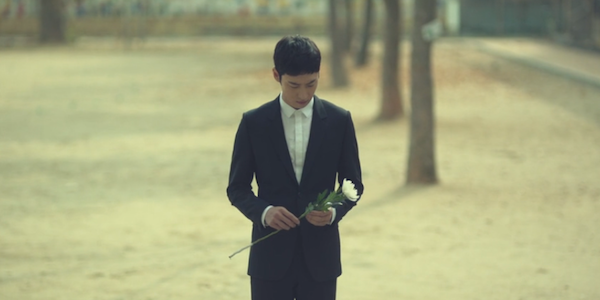 With its unique premise, Signal debuted this weekend on rising cable channel, tvN. Like many viewers, the interesting plot — detectives in the present communicate with detectives in the past to solve a serial killer case — drew me in, but it was the cinematography that wowed.
With its unique premise, Signal debuted this weekend on rising cable channel, tvN. Like many viewers, the interesting plot — detectives in the present communicate with detectives in the past to solve a serial killer case — drew me in, but it was the cinematography that wowed.
From the very first minute of episode one, Signal played like a movie, wordlessly painting a heartbreaking story. The fantastic directing and editing combined with a stellar plot, make Signal a strong contender for the next breakout drama hit.
The silent introduction of episode one sets the tone of drama — somber and distressing — and this is emphasized by the directing. Wide angles highlight the loneliness of the characters while long shots make the characters feel small. The editing continues this, taking us to the present through the motionless journey of a mother searching for answers for her murdered daughter.
Young cop Park Hae-young (Lee Je-hoon) still feels guilty over witnessing the kidnapping of Yoon Jung as a child so when he communicates with a detective (Lee Jae-han played by Jo Jin-woong) about a dead body over a discarded walkie-talkie, he decides to investigate to ease his mind.
Hae-young’s discovery of the body illustrates how well Signal controls the suspense and tone of the drama. The sense of foreboding is eased when he first finds nothing. Hae-young is lulled into a false sense of security and the viewer is cast into doubt as well — perhaps what we witnessed through the past narrative was not correct. But when Hae-young turns around and spots the other manhole, an ominous mood is cast and together, Hae-young and the viewer realize what Hae-young is about to discover.
The pacing of the episodes also adds to the show’s movie-like quality. As events unfold and the plot begins to climax, the police are in a rush to beat the clock — to solve the murder of Yoon Jung before the statute of limitations expires. The impending deadline, barely three days, keeps the story moving quickly but despite the fast pacing, Signal’s race against time does not feel rushed, nor does it lose itself within all the complications that arise. Namely, police bureaucracy and corruption, and a manipulative killer.
 The juxtaposition of the past and present narratives is also skillfully handled because they feel connected rather than disjointed; what happens in the past is directly relevant to the future. And, in episode two, vice versa. That the actions of Hae-young in the present have consequences for both the past and the present is expertly crafted. As of now, Hae-young is the only one to realize that something has changed but I look forward to his team — particularly Detective Cha Soo-hyun (Kim Hye-soo) — discovering the changes.
The juxtaposition of the past and present narratives is also skillfully handled because they feel connected rather than disjointed; what happens in the past is directly relevant to the future. And, in episode two, vice versa. That the actions of Hae-young in the present have consequences for both the past and the present is expertly crafted. As of now, Hae-young is the only one to realize that something has changed but I look forward to his team — particularly Detective Cha Soo-hyun (Kim Hye-soo) — discovering the changes.
Although Signal begins to feel more like a drama in episode two, this is not a detriment to the show. The slower pace sets the stage for character growth as well as a careful unfurling of the two concurrent mysteries: the cold case serial murders and the disappearance of Lee Jae-han. How Signal continues to weave together these intertwined narratives will determine the quality of the drama going forward. But, if these first two episodes are any indication, I’d say there’s nothing to worry about; Signal has it’s excellent directing and enticing plot on lock down.
What was your first impression of Signal?
(tvN)


